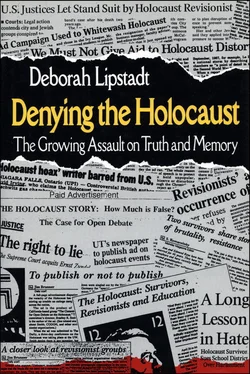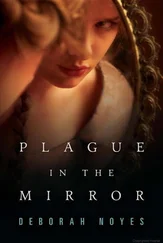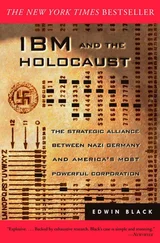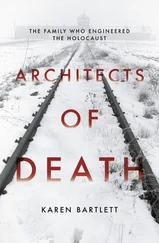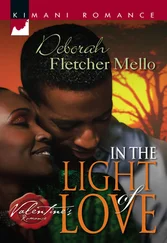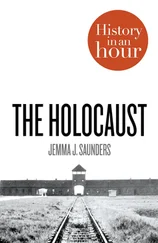———
The inroads deniers have been able to make into the American educational establishment are most disconcerting. Defenders—Noam Chomsky probably the best known among them—have turned up in a variety of quarters. The MIT professor of linguistics wrote the introduction to a book by Faurisson. Faurisson, whom the New York Times described as having “no particular prominence on the French intellectual or academic scene,” has argued that one of the reasons he does not believe that homicidal gas chambers existed is that no death-camp victim has given eyewitness testimony of actual gassings. {61} This argument contradicts accepted standards of evidence. It is as if a jury refused to convict a serial killer until one of his victims came back to say, “Yes, he is the one who killed me.” Such reasoning is so soft that it makes one wonder who could possibly take him seriously. Moreover, it ignores the extensive testimony of the Sonderkommandos who dragged the bodies from the gas chambers.
Chomsky contended that, based on what he had read of Faurisson’s work, he saw “no proof” that would lead him to conclude that the Frenchman was an antisemite. {62} According to Chomsky, not even Faurisson’s claims that the Holocaust is a “Zionist lie” are proof of his antisemitism. “Is it antisemitic to speak of Zionist lies? Is Zionism the first nationalist movement in history not to have concocted lies in its own interest?” {63} That students editing a college newspaper or television producers interested in winning viewers should prove unable to make such distinctions is disturbing. That someone of Chomsky’s stature should confuse the issue is appalling. Indeed, it was this kind of reasoning that led Alfred Kazin to describe Chomsky as a “dupe of intellectual pride so overweening that he is incapable of making distinctions between totalitarian and democratic societies, between oppressors and victims.” {64} Though Chomsky is his own unique case, his spirited defense of the deniers shocked many people including those who thought they were inured to his antics.
In his essay Chomsky argued that scholars’ ideas cannot be censored irrespective of how distasteful they may be. [4]Throughout this imbroglio Chomsky claimed that his interest was Faurisson’s civil rights and freedom to make his views known. {65} During the past few years, as deniers have intensified their efforts to insinuate themselves into the university world by placing ads denying the Holocaust in campus newspapers, echoes of Chomsky’s arguments have been voiced by students, professors, and even university presidents. (See chapter 10for additional information about denial on campus.) In response to student and faculty protests about the decision of the Duke Chronicle to run an ad denying the Holocaust, the president of Duke University, Keith Brodie, said that to have done otherwise would have “violated our commitment to free speech and contradicted Duke’s long tradition of supporting First Amendment rights.” {66} Brodie failed to note that the paper had recently rejected an ad it deemed offensive to women. No one had complained about possible violations of the First Amendment.
Let this point not be misunderstood. The deniers have the absolute right to stand on any street corner and spread their calumnies. They have the right to publish their articles and books and hold their gatherings. But free speech does not guarantee them the right to be treated as the “other” side of a legitimate debate. Nor does it guarantee them space on op-ed pages or time on television and radio shows. Most important, it does not call for people such as Chomsky to stand by them and thereby commend their views to the public. [5]
We have only witnessed the beginning of this movement’s efforts to permeate cultural, historical, and educational orbits. They must be taken seriously: Far more than the history of the Holocaust is at stake.
———
While Holocaust denial is not a new phenomenon, it has increased in scope and intensity since the mid-1970s. It is important to understand that the deniers do not work in a vacuum. Part of their success can be traced to an intellectual climate that has made its mark in the scholarly world during the past two decades. The deniers are plying their trade at a time when much of history seems to be up for grabs and attacks on the Western rationalist tradition have become commonplace.
This tendency can be traced, at least in part, to intellectual currents that began to emerge in the late 1960s. Various scholars began to argue that texts had no fixed meaning. The reader’s interpretation, not the author’s intention, determined meaning. Duke University professor Stanley Fish is most closely associated with this approach in the literary field. {67} It became more difficult to talk about the objective truth of a text, legal concept, or even an event. In academic circles some scholars spoke of relative truths, rejecting the notion that there was one version of the world that was necessarily right while another was wrong. {68} Proponents of this methodology, such as the prominent and widely read philosopher Richard Rorty, denied the allegation that they, believed that two incompatible views on a significant issue were of equal worth. {69} But others disagreed. Hilary Putnam, one of the most influential contemporary academic philosophers, thought it particularly dangerous because it seemed to suggest that every conceptual system was “just as good as the other.” {70} Still others rightfully worried that it opened the doors of the academy, and of society at large, to an array of farfetched notions that could no longer be dismissed out of hand simply because they were absurd.
Nonetheless, as a methodology this approach to texts had something to recommend it. It placed an important, though possibly overstated, emphasis on the role played by the reader’s perspective in assigning meaning to a text. It was also a reminder that the interpretations of the less powerful groups in society have generally been ignored. But it also fostered an atmosphere in which it became harder to say that an idea was beyond the pale of rational thought. At its most radical it contended that there was no bedrock thing such as experience. Experience was mediated throughone’s language. The scholars who supported this deconstructionist approach were neither deniers themselves nor sympathetic to the deniers’ attitudes; most had no trouble identifying Holocaust denial as disingenuous. But because deconstructionism argued that experience was relative and nothing was fixed, it created an atmosphere of permissiveness toward questioning the meaning of historical events and made it hard for its proponents to assert that there was anything “off limits” for this skeptical approach. The legacy of this kind of thinking was evident when students had to confront the issue. Far too many of them found it impossible to recognize Holocaust denial as a movement with no scholarly, intellectual, or rational validity. A sentiment had been generated in society—not just on campus—that made it difficult to say: “This has nothing to do with ideas. This is bigotry.”
This relativistic approach to the truth has permeated the arena of popular culture, where there is an increasing fascination with, and acceptance of, the irrational. One area in which this has been evident is in the recurring debate regarding the assassination of President Kennedy. While there is reason to question some of the conclusions of the Warren Commission, the theories regarding the killing that have increasingly gained acceptance border on the irrational. Notions of a conspiracy within the highest echelons of American government are readily accepted as plausible. According to Oliver Stone’s 1991 movie JFK, a coup d’état was underway in the United States, with the collusion of the vice president, Joint Chiefs of Staff, chief justice of the United States, FBI, CIA, members of Congress, and the Mafia. Stone’s film imposed a neat coherence on a mass of confusing information, providing a self-contained explanation for what still seemed to be an unbelievable event. Many reviewers and moviegoers alike pondered these charges with great seriousness.
Читать дальше
